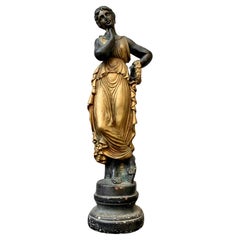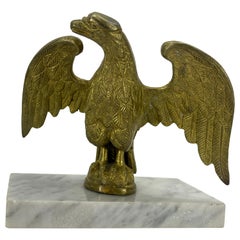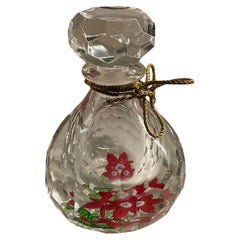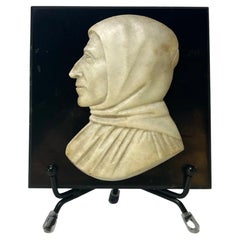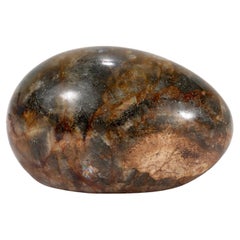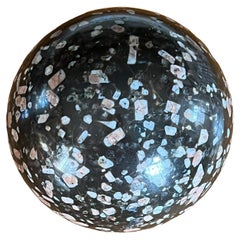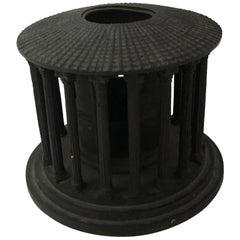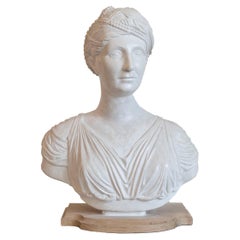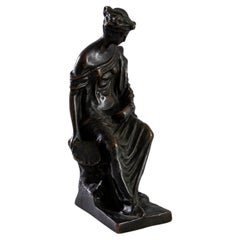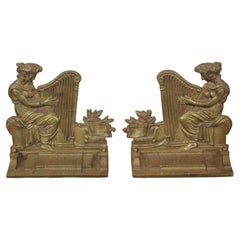Neoclassical Paperweights
Neoclassical design emerged in Europe in the 1750s, as the Age of Enlightenment reached full flower. Neoclassical furniture took its cues from the styles of ancient Rome and Athens: symmetrical, ordered, dignified forms with such details as tapered and fluted chair and table legs, backrest finials and scrolled arms.
Over a period of some 20 years, first in France and later in Britain, neoclassical design — also known as Louis XVI, or Louis Seize — would supersede the lithe and curvaceous Rococo or Louis XV style.
The first half of the 18th century had seen a rebirth of interest in classical antiquity. The "Grand Tour" of Europe, codified as a part of the proper education of a patrician gentleman, included an extended visit to Rome. Some ventured further, to sketch the ruins of ancient Greece. These drawings and others — particularly those derived from the surprising and rich archaeological discoveries in the 1730s and ’40s at the sites of the Roman cities of Pompeii and Herculaneum — caused great excitement among intellectuals and aesthetes alike.
Neoclassical furniture is meant to reflect both grace and power. The overall appearance of neoclassical chairs, tables and cabinetry is strong and rectilinear. These pieces are, in effect, classical architecture in miniature: chair and table legs are shaped like columns; cabinets are constructed with elements that mirror friezes and pediments.
Yet neoclassicism is enlivened by gilt and silver leaf, marquetry, and carved and applied ornamental motifs based on Greek and Roman sculpture: acanthus leaves, garlands, laurel wreaths, sheaves of arrow, medallions and chair splats are carved in the shapes of lyres and urns. Ormolu — or elaborate bronze gilding — was essential to French design in the 18th and 19th centuries as a cornerstone of the neoclassical and Empire styles.
As you can see from the furniture on these pages, there is a bit of whimsy in such stately pieces — a touch of lightness that will always keep neoclassicism fresh.
Find antique neoclassical furniture today on 1stDibs.
1880s Italian Antique Neoclassical Paperweights
Plaster
1810s Italian Antique Neoclassical Paperweights
Carrara Marble, Bronze
20th Century French Neoclassical Paperweights
Crystal
19th Century Italian Antique Neoclassical Paperweights
Carrara Marble
Early 20th Century English Neoclassical Paperweights
Precious Stone
Mid-19th Century Norwegian Antique Neoclassical Paperweights
Porphyry
Early 20th Century English Neoclassical Paperweights
Bronze
19th Century English Antique Neoclassical Paperweights
Crystal, Bronze
19th Century Italian Antique Neoclassical Paperweights
Bronze
19th Century Italian Antique Neoclassical Paperweights
Plaster
1880s Italian Antique Neoclassical Paperweights
Agate, Amethyst, Malachite, Onyx, Marble
19th Century European Antique Neoclassical Paperweights
Bronze
19th Century Italian Antique Neoclassical Paperweights
Marble, Porphyry
19th Century Italian Antique Neoclassical Paperweights
Marble
20th Century Neoclassical Paperweights
Stone, Marble
Early 20th Century Czech Neoclassical Paperweights
Glass
2010s Italian Neoclassical Paperweights
Marble
2010s Italian Neoclassical Paperweights
Marble
Early 20th Century Czech Neoclassical Paperweights
Glass
Late 19th Century Austrian Antique Neoclassical Paperweights
Bronze
Early 1900s French Antique Neoclassical Paperweights
Bronze
Late 19th Century Antique Neoclassical Paperweights
Bronze
Mid-20th Century American Neoclassical Paperweights
Brass
18th Century Italian Antique Neoclassical Paperweights
Marble
Early 20th Century French Neoclassical Paperweights
Brass
Early 20th Century French Neoclassical Paperweights
Malachite, Bronze, Ormolu
1950s Italian Vintage Neoclassical Paperweights
Silver
Early 19th Century Italian Antique Neoclassical Paperweights
Marble
Late 20th Century Neoclassical Paperweights
Bronze
18th Century Italian Antique Neoclassical Paperweights
Marble
18th Century Italian Antique Neoclassical Paperweights
Marble
20th Century Neoclassical Paperweights
Belgian Black Marble, Brass
